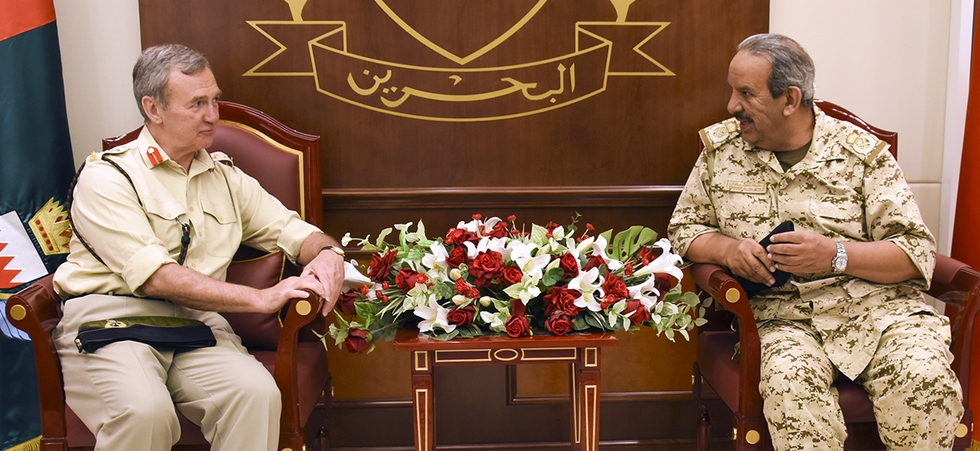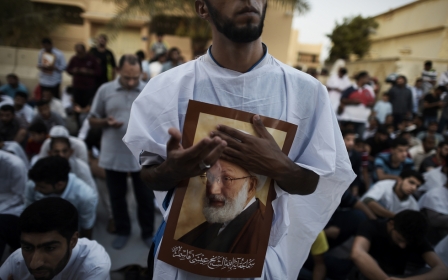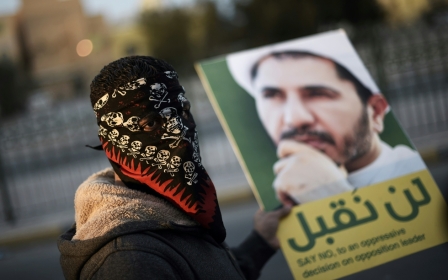Head of UK's armed forces in Bahrain as Shia cleric stripped of citizenship

The head of Britain's armed forces met with high-ranking security officials in Bahrain less than a day after the kingdom controversially revoked the citizenship of the country's top Shia cleric, it can be revealed.
The move to strip Ayatollah Isa Qassim of his citizenship was labelled "clearly unjustified” by the United Nations on Monday and is the latest step taken by Bahrain - where a Shia majority is ruled by a Sunni monarchy - in what appears to be an escalating campaign against dissent in the Western-allied Gulf kingdom.
The meeting on Tuesday between General Sir Nicholas Houghton, the outgoing British chief of the defence staff, and Bahrain's top soldier, Shaikh Khalifa bin Ahmed Al Khalifa, has been described as a "green light" to repression by human rights campaigners and stands in stark contrast to the mounting criticism in diplomatic circles of the country’s clampdown on opposition figures.
The high-level meeting came only hours after a leading Iranian general warned Bahrain that its decision to strip Qassim of citizenship will fan armed rebellion in the kingdom and has been met with fierce criticism by British opposition politicians and human rights campaigners.
The warning from General Qassem Suleimani, head of the elite Revolutionary Guards' overseas operations arm, the Quds Force, could also prompt fears that British interests in the strategically vital Gulf kingdom could be under threat.
Tim Farron MP, leader of the Liberal Democrats, told Middle East Eye that the visit was a "sad demonstration of just how little" the British government cares about human rights and said he would write to the Ministry of Defence to demand publication of minutes from the meeting in Bahrain.
Pressure on the government in Manama was ratcheted up on Tuesday, amid reports of continuing protests over the stripping of the cleric's citizenship, when the official spokesperson for the UN human rights office said the move was in breach of international law.
“Given that due process was not followed, it cannot be justified,” Ravina Shamdasani told a UN briefing in Geneva.
She said that under international law, deprivation of nationality was permitted under certain conditions, but it must serve a legitimate purpose and be proportionate to the interests protected. There must also be some recourse to appeal, she added.
“Given the numbers that we're talking about in Bahrain, we're talking a minimum of 250 people who have been deprived of their nationality, but there are some estimates that go much higher than that. Given that, it is clearly unjustified,” she said.
“We are very concerned at this intensified crackdown on the freedoms of expression and association and the right to a nationality. We urge the Bahraini authorities to seek to de-escalate the situation – instead of taking such damaging steps in quick succession with a serious risk of escalating the situation."
The US, a close ally to Bahrain which hosts the US Fifth Fleet, has also criticised the decision. “We are alarmed by the government of Bahrain's decision to revoke the citizenship of prominent Shia cleric Sheikh Isa Qassim,” State Department spokesman John Kirby said on Monday
“We remain deeply troubled by the government of Bahrain's practice of withdrawing the nationality of its citizens arbitrarily.”
'Green light for repression'
Earlier this week, British-based campaign group, the Bahrain Institute for Rights and Democracy (BIRD), said the arrest would “escalate tensions” and could “lead to violence,” while Human Rights Watch said it took the country “into the darkest days” since 2011, when demonstrators took to the streets to demand greater political rights and an end to discrimination against the Shia majority.
Sayed Alwadeai, the director of advocacy at BIRD, said: “Bahrain's ally the UK did not even postpone a meeting on military cooperation, let alone issue a statement on this gross repression of Bahrain's civil society. Britain is giving Bahrain a green light for repression.“
The meeting came on the same day that a Bahraini court extended the detention of human rights defender Nabeel Rajab, who was re-arrested on 13 June for “spreading false news and rumours about the internal situation in a bid to discredit Bahrain”.
It also comes amid continued scrutiny over the close relationship between London and Manama in the wake of a deal to establish a new British Royal Navy base in the country and revelations earlier this year that British naval commandoes were training Bahraini security forces in sniping techniques.
Farron said: “It’s a sad demonstration of just how little this government cares about human rights when a top UK general visits Bahrain the day the UN has condemned their regime for persecuting religious leaders and crushing political opposition.
“Britain cannot claim to champion universal rights while pandering to these regimes. It undermines all of the great work done by the Foreign Office and the Department for International Development worldwide.
“I have written to the Ministry of Defence demanding they publish transcripts or minutes from the meetings General Sir Nicholas Houghton attended in Bahrain. If they will defend his being there, they should have nothing to hide.”
Amnesty International UK’s head government affairs, Allan Hogarth, told MEE: “Since its shiny new naval base in Bahrain was announced, the UK has apparently been prioritising its military ties rather than rocking the boat over the Bahrain’s increasingly dismal human rights record.
“With ongoing arrests, a long-running crackdown on protests, frequent reports of torture in custody and a host of prisoners of conscience now behind bars, the situation in Bahrain gets worse by the week.
“The UK needs to completely re-evaluate its relationship with Bahrain. Ministers, diplomats and senior military figures like Sir Nicholas should all be addressing Bahrain’s human rights situation, including by speaking out publicly.”
Following General Houghton's visit, the British Foreign Office told MEE that it was “concerned by reports that the nationality of Bahraini Shia cleric Sheikh Isa Qassim is being revoked”.
The spokesperson added that the British government is “seeking urgent clarification and further detail from from the Bahraini authorities”.
Britain has always been a strong ally of Bahrain and Nicholas McGeehan, Gulf researcher at Human Rights Watch, said US condemnations over human rights violations in Bahrain had “definitely been better” than the statement made by British official.
He said: “But expressions of concern, however strong, aren’t going to stop this crackdown.
"I don’t think any credible observer believes the UK is intent on anything other than sticking as close to the Bahrainis and the Saudis and the Emiratis as possible, irrespective of their conduct and the gravity of their rights abuses.
"The US has been stronger in its criticism, but if it is truly interested in a stable Bahrain, it needs to do and say more to arrest this slide."
New MEE newsletter: Jerusalem Dispatch
Sign up to get the latest insights and analysis on Israel-Palestine, alongside Turkey Unpacked and other MEE newsletters
Middle East Eye delivers independent and unrivalled coverage and analysis of the Middle East, North Africa and beyond. To learn more about republishing this content and the associated fees, please fill out this form. More about MEE can be found here.




